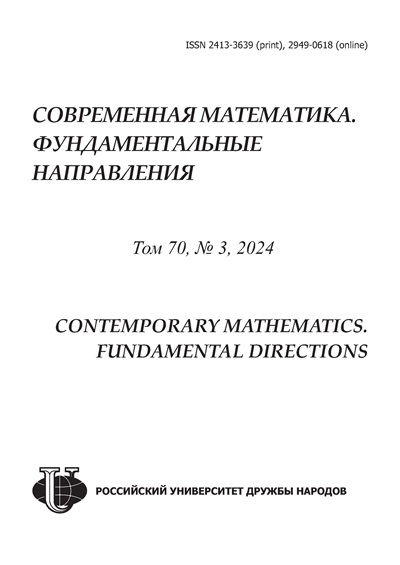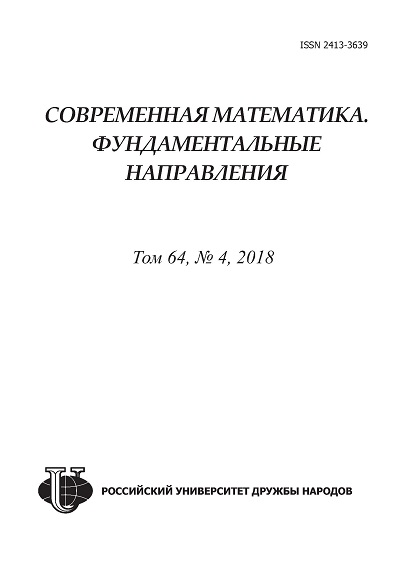Vol 64, No 4 (2018): Contemporary Problems in Mathematics and Physics
- Year: 2018
- Articles: 9
- URL: https://journals.rudn.ru/CMFD/issue/view/1255
- DOI: https://doi.org/10.22363/2413-3639-2018-64-4
Full Issue
New Results
A Discrete Analog of the Lyapunov Function for Hyperbolic Systems
Abstract
We study the difference splitting scheme for the numerical calculation of stable solutions of a two-dimensional linear hyperbolic system with dissipative boundary conditions in the case of constant coefficients with lower terms. A discrete analog of the Lyapunov function is constructed and an a priori estimate is obtained for it. The obtained a priori estimate allows us to assert the exponential stability of the numerical solution.
Contemporary Mathematics. Fundamental Directions. 2018;64(4):591-602
 591-602
591-602


Restrictions on Parameters of Minimal Supersymmetric Standard Model
Abstract
Higgs boson with mass mh = 126 GeV was discovered at Large Hadron Collider in 2012. Its mass corresponds both to Standard Model of elementary-particles physics and to the mass of the most lightweight Higgs boson in the minimal supersymmetric Standard Model. In this paper, we consider the MSSM model not preserving CP-invariance that contain a large number of parameters to be variated. Using the experimental value of the Higgs boson mass, we obtain the restrictions on the parameters of the model, describe phenomenological scenarios, and analyze possible areas of the space of parameters.
Contemporary Mathematics. Fundamental Directions. 2018;64(4):603-615
 603-615
603-615


A Real-Time Iterative Projection Scheme for Solving the Common Fixed Point Problem and Its Applications
Abstract
In this paper, we are concerned with the Common Fixed Point Problem (CFPP) with demicontractive operators and its special instance, the Convex Feasibility Problem (CFP) in real Hilbert spaces. Motivated by the recent result of Ordon˜ ez et al. [35] and in general, the field of online/real-time algorithms, e.g., [20, 21, 30], in which the entire input is not available from the beginning and given piece-by-piece, we propose an online/real-time iterative scheme for solving CFPPs and CFPs in which the involved operators/sets emerge along time. This scheme is capable of operating on any block, for any finite number of iterations, before moving, in a serial way, to the next block. The scheme is based on the recent novel result of Reich and Zalas [37] known as the Modular String Averaging (MSA) procedure. The convergence of the scheme follows [37] and other classical results in the fields of fixed point theory and variational inequalities, such as [34]. Numerical experiments for linear and non-linear feasibility problems with applications to image recovery are presented and demonstrate the validity and potential applicability of our scheme, e.g., to online/real-time scenarios.
Contemporary Mathematics. Fundamental Directions. 2018;64(4):616-636
 616-636
616-636


The Schwarz Inequality and the Schwarz Formula for A-Analytic Functions
Abstract
In this paper, we study A-analytic functions. We consider main fundamental theorems of the theory of A-analytic functions and prove analogs of the Schwarz inequality, the Schwars formula, and the Poisson formula for A-analytic functions.
Contemporary Mathematics. Fundamental Directions. 2018;64(4):637-649
 637-649
637-649


On Boundedness of Maximal Operators Associated with Hypersurfaces
Abstract
In this paper, we obtain the criterion of boundedness of maximal operators associated with smooth hypersurfaces. Also we compute the exact value of the boundedness index of such operators associated with arbitrary convex analytic hypersurfaces in the case where the height of a hypersurface in the sense of A. N. Varchenko is greater than 2. Moreover, we obtain the exact value of the boundedness index for degenerated smooth hypersurfaces, i.e., for hypersurfaces satisfying conditions of the classical Hartman-Nirenberg theorem. The obtained results justify the Stein-Iosevich-Sawyer hypothesis for arbitrary convex analytic hypersurfaces as well as for smooth degenerated hypersurfaces. Also we discuss some related problems of the theory of oscillatory integrals.
Contemporary Mathematics. Fundamental Directions. 2018;64(4):650-681
 650-681
650-681


Computably Separable Models
Abstract
We state fundamental results of structural theory of computably separable models and consider applications of this theory to solution of some actual problems of the theory of effective linear orders and theoretical informatics.
Contemporary Mathematics. Fundamental Directions. 2018;64(4):682-705
 682-705
682-705


On Complexification of Real Spaces and Its Manifestations in the Theory of Bochner and Pettis Integrals
Abstract
This work is a continuation of our work [12] where we considered linear spaces in the following two situations: a real space admits a multiplication by complex scalars without changing the set itself; a real space is embedded into a wider set with a multiplication by complex scalars. We studied there also how they manifest themselves when the initial space possesses additional structures: topology, norm, inner product, as well as what happens with linear operators acting between such spaces. Changing the linearities of the linear spaces unmasks some very subtle properties which are not so obvious when the set of scalars is not changed. In the present work, we follow the same idea considering now Bochner and Pettis integrals for functions ranged in real and complex Banach and Hilbert spaces. Finally, this leads to the study of strong and weak random elements with values in real and complex Banach and Hilbert spaces, in particular, some properties of their expectations.
Contemporary Mathematics. Fundamental Directions. 2018;64(4):706-722
 706-722
706-722


Construction of Optimal Interpolation Formulas in the Sobolev Space
Abstract
In the present paper, using the discrete analog of the differential operator d2m/dx2m, optimal interpolation formulas are constructed in L2(4)(0, 1) space. The explicit formulas for coefficients of optimal interpolation formulas are obtained.
Contemporary Mathematics. Fundamental Directions. 2018;64(4):723-735
 723-735
723-735


 736-748
736-748












